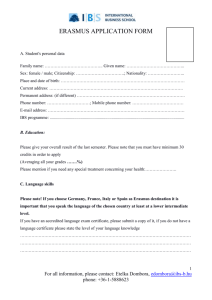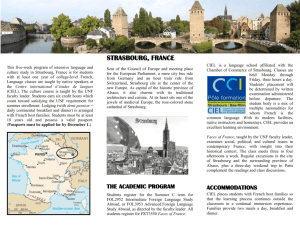Matthew Tiffin 2012-13 - University of Warwick
advertisement
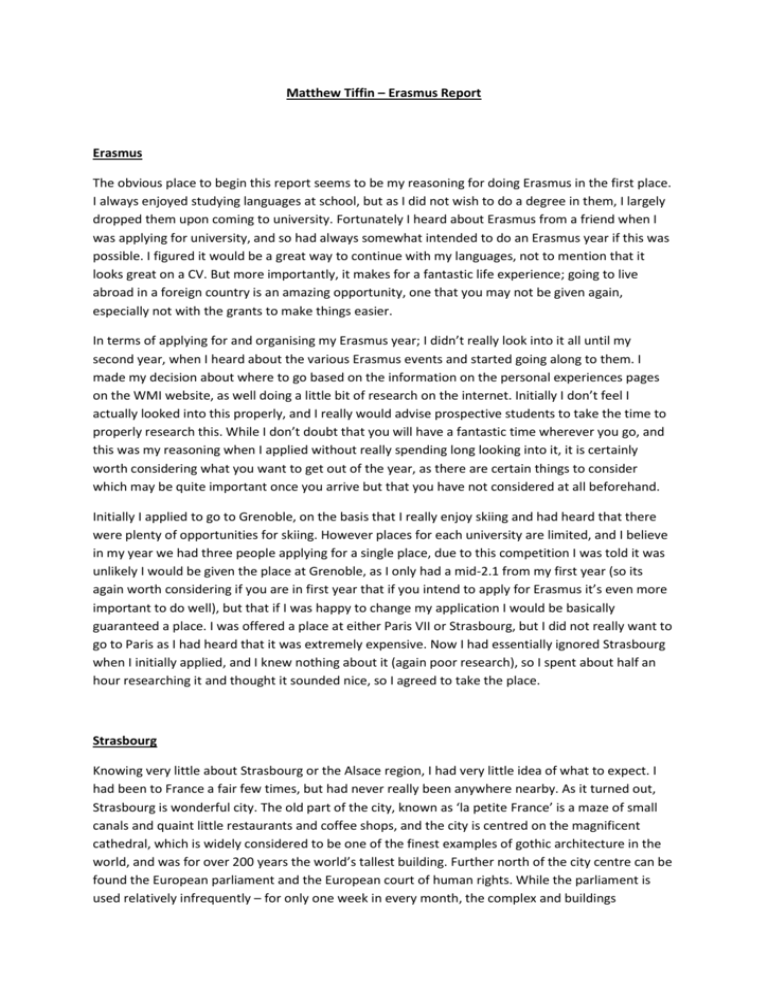
Matthew Tiffin – Erasmus Report Erasmus The obvious place to begin this report seems to be my reasoning for doing Erasmus in the first place. I always enjoyed studying languages at school, but as I did not wish to do a degree in them, I largely dropped them upon coming to university. Fortunately I heard about Erasmus from a friend when I was applying for university, and so had always somewhat intended to do an Erasmus year if this was possible. I figured it would be a great way to continue with my languages, not to mention that it looks great on a CV. But more importantly, it makes for a fantastic life experience; going to live abroad in a foreign country is an amazing opportunity, one that you may not be given again, especially not with the grants to make things easier. In terms of applying for and organising my Erasmus year; I didn’t really look into it all until my second year, when I heard about the various Erasmus events and started going along to them. I made my decision about where to go based on the information on the personal experiences pages on the WMI website, as well doing a little bit of research on the internet. Initially I don’t feel I actually looked into this properly, and I really would advise prospective students to take the time to properly research this. While I don’t doubt that you will have a fantastic time wherever you go, and this was my reasoning when I applied without really spending long looking into it, it is certainly worth considering what you want to get out of the year, as there are certain things to consider which may be quite important once you arrive but that you have not considered at all beforehand. Initially I applied to go to Grenoble, on the basis that I really enjoy skiing and had heard that there were plenty of opportunities for skiing. However places for each university are limited, and I believe in my year we had three people applying for a single place, due to this competition I was told it was unlikely I would be given the place at Grenoble, as I only had a mid-2.1 from my first year (so its again worth considering if you are in first year that if you intend to apply for Erasmus it’s even more important to do well), but that if I was happy to change my application I would be basically guaranteed a place. I was offered a place at either Paris VII or Strasbourg, but I did not really want to go to Paris as I had heard that it was extremely expensive. Now I had essentially ignored Strasbourg when I initially applied, and I knew nothing about it (again poor research), so I spent about half an hour researching it and thought it sounded nice, so I agreed to take the place. Strasbourg Knowing very little about Strasbourg or the Alsace region, I had very little idea of what to expect. I had been to France a fair few times, but had never really been anywhere nearby. As it turned out, Strasbourg is wonderful city. The old part of the city, known as ‘la petite France’ is a maze of small canals and quaint little restaurants and coffee shops, and the city is centred on the magnificent cathedral, which is widely considered to be one of the finest examples of gothic architecture in the world, and was for over 200 years the world’s tallest building. Further north of the city centre can be found the European parliament and the European court of human rights. While the parliament is used relatively infrequently – for only one week in every month, the complex and buildings themselves are very impressive and the university runs fairly regular tours around the parliament building, which are well worthwhile if you are interested in seeing the inner workings of European politics. Unfortunately the court of human rights does not appear to run tours (or at least I never saw any), but again the building is quite impressive and from time to time protests take place outside. It is also worthwhile mentioning the nearby parc d’orangerie, which particularly when the weather is good is a fantastic place to spend the afternoon or go for a run. Strasbourg also has an excellent internal travel network, with five tram lines and numerous bus routes, all of which are covered by the cost of a travel pass for €22.80 a month (or less if you can convince them you are unemployed and can’t afford it). The city is also excellently situated, right on the German border. It is possible to get over to the nearby German city of Kehl within the price of the local bus and tram tickets, and this trip can be done quite easily within about 15 minutes, which is fantastic if you want to make use of the slightly better German supermarkets (sadly there is not a lot else there), or simply to get into Germany so that you can make use of the brilliant and cheap local German rail network, making it very affordable to get to almost anywhere in Bavaria (Oktoberfest in particular is an extremely reasonable possibility!) Switzerland is also extremely quick and easy to get to from Strasbourg (although it is significantly more expensive to do so), as is the entire Alsace and Luxembourg (again quite expensive, but not unreasonable as long as you don’t intend to stay the night). Further afield it is still quite easy to get to most of France as well as Belgium and the Netherlands. Strasbourg really is a gateway to Europe, and it really is possible to get to almost anywhere in Europe within a day, for a very reasonable price, especially with a little bit of research. Personally throughout the year I visited numerous places, primarily Munich and Stuttgart in Germany, Geneva in Switzerland, Grenoble and Annecy in France, Amsterdam in the Netherlands, Prague in the Czech Republic and Zadar in Croatia. I also managed to visit large sections of the Alsace region itself on short daytrips. I really cannot emphasise enough how many opportunities there were for travelling, and how fantastic it is to take these opportunities and visit the wide variety of cultures and people within Europe, places that you may never have the opportunity to visit again, and certainly not so easily and cheaply. It is probably also worth mentioning that due to Strasbourg’s location, as well as the presence of these various international facilities, the city is highly diverse and multicultural. In practice this means that a lot of people will tend to speak German as well as French (Strasbourg was historically a part of Germany until the World Wars, although the whole region of Alsace has been constantly competed over for hundreds of years). However a surprisingly high number of people will also speak English, which can cause problems or make life easier depending on your point of view. If one of your primary objectives for the year is improving your French, you may find that Strasbourg is not as well-suited to this as other cities, and if you are struggling with your French people may just switch to English when talking to you. On the flip side, if you are concerned about your level of French, you may find that this is a positive for you. It is probably a rather minor thing, but it is worthy of consideration. University With all of this travelling, it is almost easy to forget that while I was in Strasbourg I was attending the university there. The University system in France (or at least in Strasbourg) is quite different to what we have in Warwick. There is none of the flexibility in the course that we have here, and the French students all have set modules which they must take based on what year and semester they are in. Erasmus students have relative freedom to choose what modules they want, as long as Warwick is happy with the modules you are taking. I had a lot of difficulty in organising my course, as upon arrival I was essentially not given any instructions as to what the format was for choosing and organising my modules actually was. I had somewhat expected there to be some kind of orientation week or weekend (or at least event) organised for the incoming international students, but there was nothing of the sort, barring one introductory lecture to the Erasmus students, which was quite simply just a ‘welcome to Strasbourg, we hope you have a good year’ lecture, and as such was not hugely helpful. After many inquiries I managed to register at the mathematics office and was given a module registration form, and told that the module list could be found online. At this point the system somewhat fell apart, as you are unable to log into the website until your registration is complete and you have your student card, which can take a number of days and even weeks. This issue was further compounded by the fact that nobody really seemed to know what modules were available to me, I inquired with the mathematics department Erasmus coordinator (who was required to sign off on all my forms) but he proved relatively useless and I was told that he couldn’t help me and that I should ask the mathematics office, who also told me to ask him. Eventually I was able to log in and find the module list, and based on the lack of any guidance I figured I was allowed to take realistically any reasonable maths modules, which in the end is what I did and it seemed to work out fine. Unfortunately due to the inflexibility of the French course, the timetable is not configured to allow for people to take anything other than the set modules for each year and semester group. In practice this means that the only realistic way to avoid clashes is to take the set modules for one of the groups, but unfortunately this may result in you taking courses that you have not done the prerequisites for, or courses that are so far below your level that it may not be entirely worthwhile. French student are also required to take a language course every semester, so depending on what year group you are fitting into and your previous experience of the language this may not be possible for you, as intermediate/advanced French/German may be a little too difficult, while intermediate/advanced English is likely to be a bit of a waste of time. It is worthwhile noting that if you wish to do a language course, there is a separate department on the campus called SPIRAL which runs language courses for international students, and these are far more appropriate, although I elected in the end not to do them, favouring to focus on my maths modules. In the end in first semester I elected to do the second year geometry and analysis courses, which were relatively simple courses, geometry being quite basic concepts and analysis being similar content to the first and second year analysis courses at Warwick, although it was interesting to see where the French put a different spin on certain concepts, often approaching things from an entirely different angle, which I found quite useful for improving my understanding of the topics. I also took the third year differential equations, algebra and topology courses. Again there was quite a deal of overlap with courses at Warwick, with differential equations essentially being Warwick’s second year PDEs course, algebra being largely based on Warwick’s algebra II course, although also with some significantly different content in places, and topology being Warwick’s metric spaces course, although again it went slightly beyond the content covered at Warwick. Second semester I chose to do second year numerical analysis and complements of analysis courses. These were largely new subjects for me, as although some of the topics have been covered from various courses throughout the first two years at Warwick, no single course that I had done covered either of them to a great degree, so this was an opportunity to learn some new concepts and again also to flesh out existing ones and see how things link together. For my last three modules (you are required to take roughly 60 ECTs credits, which amounts to 10 mathematics modules), I chose third year algebra, algebra and combinatorics and complex analysis courses. Again, these were largely similar to courses I had already taken, although several, primarily algebra, went quite a bit beyond the scope of the corresponding second year courses at Warwick. It is worth mentioning several of the significant differences in the way the courses in France are taught compared to here in Warwick. The first obvious difference that you will likely notice on arrival is the length of the lectures/seminars (or TDs as the French call them); the standard length in the mathematics institute being two or three hours. Three hours in particular can be somewhat a shock compared to Warwick, but fortunately there is usually at least one break, and often the lectures are somewhat similar to lessons at school, spending half an hour going through something, and then half an hour independently doing exercises while the teacher moves around helping with problems. Interestingly (although perhaps not surprisingly), the French in lectures does not present anywhere near as much of a problem as you might anticipate, as almost all of the notation used in mathematics is universal. There are minor things that may at first cause some problems, such as st (such that) being replaced with tq (tel que), but you every quickly learn these differences. I took to carrying a small notebook to lectures and jotting down things like this, which proved to be invaluable. On a similar note, it is extremely worthwhile to mention at the start of the year to your lecturers that you are an Erasmus student, as certain among them will take the time to come over while people are working on exercises to check if you have any problems with comprehension, and they can be very helpful. The largest problem that you are likely to encounter is the handwriting of the lecturers, French handwriting being notably different from English, and at times it was completely illegible to me, particularly encountering somewhat unfamiliar words. To compound this problem, French lecturers do not seem to believe in uploading their lecture notes to the university intranet, which can mean that your notes are sadly lacking come exam season. Fortunately the French students who have had years of practice with this system almost all produce beautifully written and typed up notes, so it is a good idea to befriend the people in your lectures. Student Life Student life in Strasbourg is probably one of the most marked differences compared to Warwick. Meeting other students seems to be done almost entirely through your department, there is no students union and therefore no organised society system (societies exist, but they are largely student organised and almost entirely academically based), sports teams are organised but in order to join a team you have to pass a medical examination, which can be quite a pain to organise, and even then the sports teams seem to be almost entirely sports based, with little other social aspect. Initially I lived in the student halls in Robertsau (more on this later), and was surprised to see that students to do not particularly socialise within their halls at all. The reason for this seems to largely be a difference in the French attitude to university, with the vast majority of French students simply going to their local university, in a similar manner to school, and living at home. I found that I spent the vast majority of my time with other Erasmus students, as the Erasmus department runs fairly regular events, every couple of weeks, and you find that the vast majority of other Erasmus students are in the same situation that you are in, and so it’s very easy to make friends with them. It’s also worth noting that there are actually three universities in Strasbourg: ‘Université de Strasbourg,’ ‘Ecole du Management’ (EM) and ‘Institut d'études politiques de Strasbourg’ (Science Po), and you will likely find students of all three living in the university residences. EM in particular takes in a lot of Erasmus students; in fact it teaches the vast majority of its courses in English, so you will likely find that there are a significant number of English speaking students around. There are a number of museums and other tourist attractions in Strasbourg, the boat ride in particular gives an excellent tour of the majority of the city centre’s interesting locations. In terms of more day-to-day activities, there are several cinemas in Strasbourg, showing films both dubbed and subtitled. Strasbourg also has an excellent culture of brewing beer, with a huge number of brasseries throughout the city, which are essentially bars that brew their own beer, and some of these are excellent. Being so close to the German border, many bars also have a huge variety of German beers, so there are plenty of opportunities to try new beers for those who are interested. Strasbourg, like the rest of France, also has a rich café culture, and there are a multitude of pleasant coffee shops to spend an afternoon in. Fortunately for people who enjoy going out, there are a decent variety of nightclubs in Strasbourg. La Salamandre is arguably the most popular (and also probably the largest) and the music tends to be good, but it is not hugely cheap inside and it is basically just a big dance floor with a bar. Le Rafiot is also quite popular and particularly in the first month there it ran regular Erasmus events, which is actually where I met most of my eventual friends, as you will basically find that it is just full of Erasmus students. It is also worth mentioning that it is a boat (it’s permanently moored), which is quite a novelty and is quite cool. There is also La Mezzanine, which is decent but sadly was closed for refurbishment for half the time I was there. There are a couple of others but otherwise there are a huge number of bars that remain open until late and play music, but very few of these could be considered clubs. Also worthy of mention is K3 in Kehl. Personally I found this to be by far the best night out in Strasbourg (although it’s not strictly in Strasbourg), with the best music and atmosphere by far, but unless you are happy with a forty minute walk you have to get on the special shuttle buses to and from K3, which run on a Friday from near campus. In terms of money, Strasbourg is somewhat mixed. Whilst it is entirely possible to live extremely cheaply, especially with the huge number of government grants available, as well as no tuition fees and very cheap university accommodation, as soon as you decide to start eating at restaurants or going out in the evening you will notice that prices are quite a lot higher. Fortunately the university canteens serve three meals a day, with dinner being three courses for €3, which is very reasonable even if the quality was not always very high, but with university accommodation’s cooking facilities being as minimal as they are (two hobs between sixteen people) it is difficult to avoid eating out fairly regularly. In terms of phones, if you can get a French bank account, and you may need to for some of the grants (I opened one at Société Générale, and found them to be very helpful and tolerant of my difficulties), then you can get very cheap contracts at most of the major network operators. However on arrival I didn’t have a bank account and so I simply bought a cheap pay-asyou-go phone from the post office, which was pretty good, although sadly in France for some reason credit is periodically wiped from your phone if you don’t top up, which is a pain if you aren’t spending your credit fast enough. University accommodation in Strasbourg is run by CROUS, who will offer all Erasmus students a place in halls (provided you apply on time). The accommodation is all fairly basic, but you pay around €155 a month for a room. It is worth noting that this does not include internet access, which costs another €10 a month and can be a nightmare to set up. I did not do a very good job of researching the various halls of residence and so applied based on price, with cheapest as my first preference. This ultimately was somewhat of a mistake, as I was placed in halls in Robertsau, which is to the north of the city centre, about twenty minutes tram ride from the university campus, or about half an hour’s walk. This initially seemed fine, but the trams stop just after midnight, and I found that I was often staying with friends to avoid the half hour walk along the riverbanks in the cold and dark alone. As I mentioned I did not find my flatmates to be very sociable and the cooking facilities were rather strained, so I decided to move out during the second semester. I moved to the residences of La Marne, in a shared flat with one other person, and found this to be much better, although the rent was nearly twice as much, as I was now only five minutes’ walk from campus and I also found the other residents to be much more sociable. Having said that I know of plenty of people who were in other university residences and were quite happy there, so it may have just been personal preference. It is also worth considering that the French government subsidises anyone who is living away from their parents with the CAF grant, and this can be a huge proportion of your rent, so you may be surprised what you can afford if you can organise this. As with all things in France, the paperwork required is huge and time-consuming, and will inevitably take numerous trips to the office to complete. Erasmus Experience Overall, it is difficult to argue that my year on Erasmus was not the best year of my life. Of course I had lots of difficulties, many of which I have mentioned here so that future students may be able to handle them better than I did, but if I’m honest for me that was all part of the experience. The huge number of subtle differences in everything from university to simple daily life is amazing, and now that I’m back I regularly miss various little things about living in Strasbourg. I feel I have gained a huge amount of self-confidence in myself, particularly in handling new and strange situations. I have seen so much of various other cultures and met people from all over the world, from Australia to Argentina, from Spain and America to as close to us as Ireland, I have made friends from all over the world. Erasmus is an experience that it is almost impossible to quantify in words; the only way to really experience it is to take the opportunity.
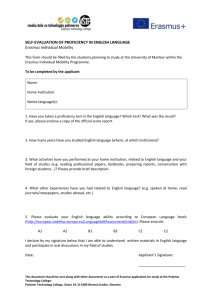
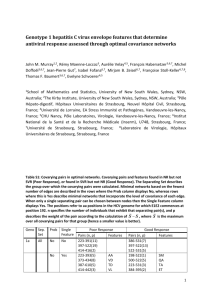
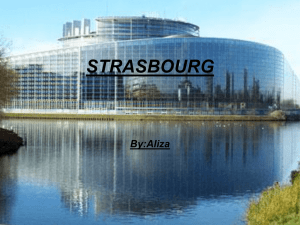
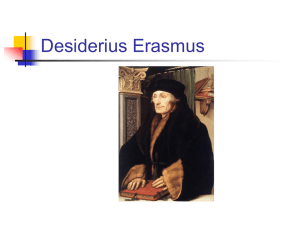
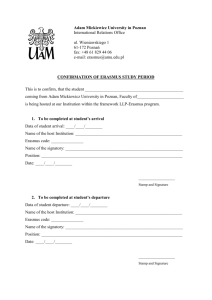
![topic 2 [ DRELINT31072013_4 ]](http://s3.studylib.net/store/data/006588693_1-de4360da5c0e5ab99aada30ed72f8d6f-300x300.png)
